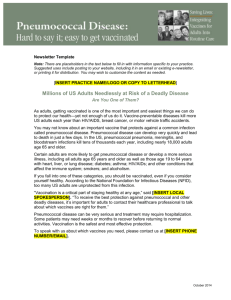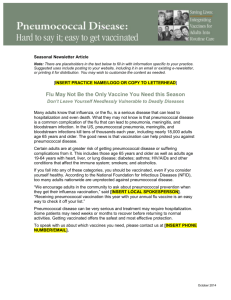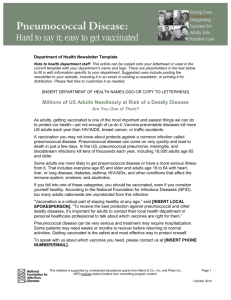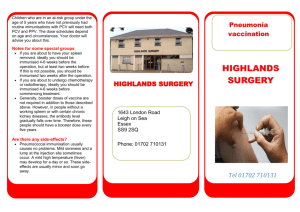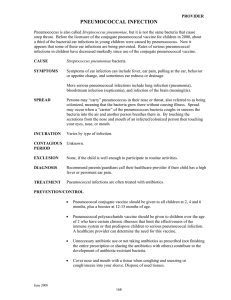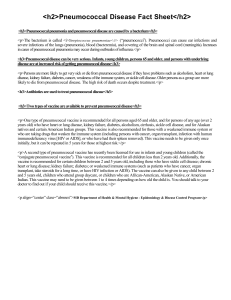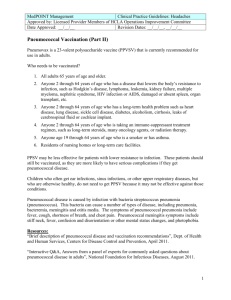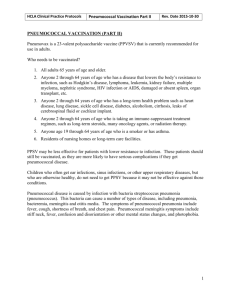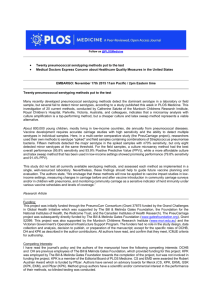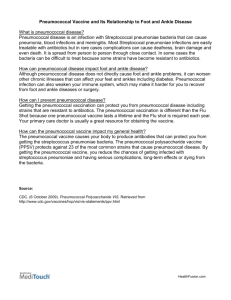VIS-_Pneumovax - Port Jeff Medical Care
advertisement
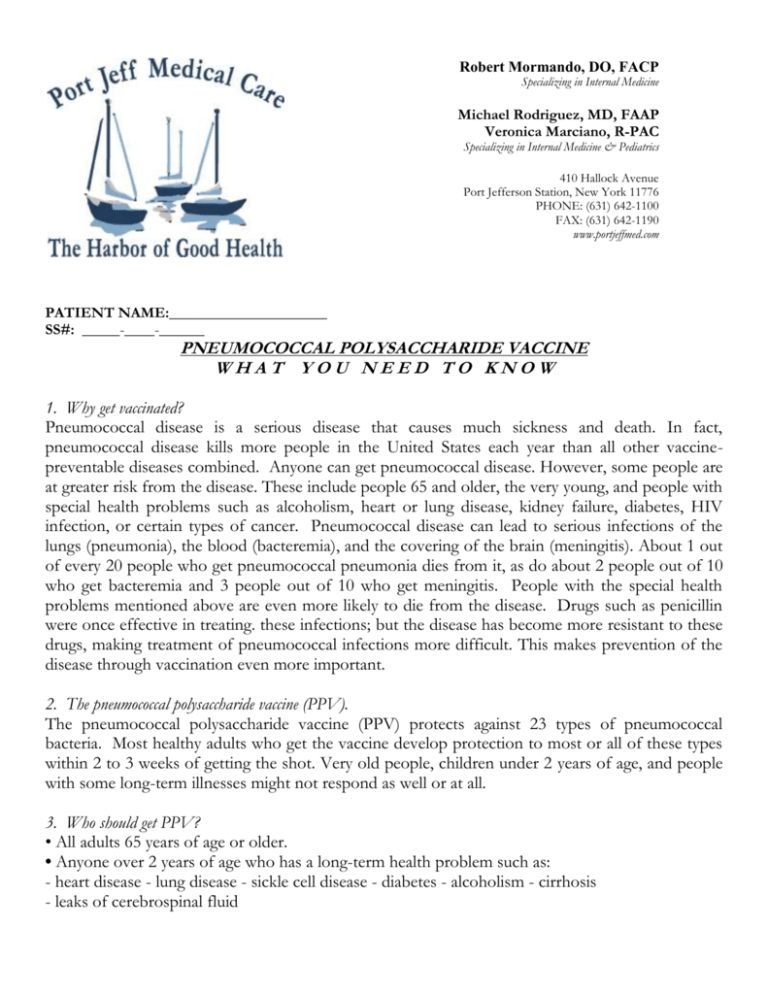
Robert Mormando, DO, FACP Specializing in Internal Medicine Michael Rodriguez, MD, FAAP Veronica Marciano, R-PAC Specializing in Internal Medicine & Pediatrics 410 Hallock Avenue Port Jefferson Station, New York 11776 PHONE: (631) 642-1100 FAX: (631) 642-1190 www.portjeffmed.com PATIENT NAME:_____________________ SS#: _____-____-______ PNEUMOCOCCAL POLYSACCHARIDE VACCINE WHAT YOU NEED TO KNOW 1. Why get vaccinated? Pneumococcal disease is a serious disease that causes much sickness and death. In fact, pneumococcal disease kills more people in the United States each year than all other vaccinepreventable diseases combined. Anyone can get pneumococcal disease. However, some people are at greater risk from the disease. These include people 65 and older, the very young, and people with special health problems such as alcoholism, heart or lung disease, kidney failure, diabetes, HIV infection, or certain types of cancer. Pneumococcal disease can lead to serious infections of the lungs (pneumonia), the blood (bacteremia), and the covering of the brain (meningitis). About 1 out of every 20 people who get pneumococcal pneumonia dies from it, as do about 2 people out of 10 who get bacteremia and 3 people out of 10 who get meningitis. People with the special health problems mentioned above are even more likely to die from the disease. Drugs such as penicillin were once effective in treating. these infections; but the disease has become more resistant to these drugs, making treatment of pneumococcal infections more difficult. This makes prevention of the disease through vaccination even more important. 2. The pneumococcal polysaccharide vaccine (PPV). The pneumococcal polysaccharide vaccine (PPV) protects against 23 types of pneumococcal bacteria. Most healthy adults who get the vaccine develop protection to most or all of these types within 2 to 3 weeks of getting the shot. Very old people, children under 2 years of age, and people with some long-term illnesses might not respond as well or at all. 3. Who should get PPV? • All adults 65 years of age or older. • Anyone over 2 years of age who has a long-term health problem such as: - heart disease - lung disease - sickle cell disease - diabetes - alcoholism - cirrhosis - leaks of cerebrospinal fluid • Anyone over 2 years of age who has a disease or condition that lowers the body’s resistance to infection, such as: - Hodgkin’s disease - lymphoma, leukemia - kidney failure - multiple myeloma - nephrotic syndrome - HIV infection or AIDS. - damaged spleen, or no spleen - organ transplant • Anyone over 2 years of age who is taking any drug or treatment that lowers the body’s resistance to infection, such as: - long-term steroids - certain cancer drugs - radiation therapy • Alaskan Natives and certain Native American populations. 4. How many doses of PPV are needed? Usually one dose of PPV is all that is needed. However, under some circumstances a second dose may be given. • A second dose is recommended for those people aged 65 and older who got their first dose when they were under 65, if 5 or more years have passed since that dose. • A second dose is also recommended for people who: - have a damaged spleen or no spleen - have sickle-cell disease - have HIV infection or AIDS - have cancer, leukemia, lymphoma, multiple myeloma - have kidney failure - have nephrotic syndrome - have had an organ or bone marrow transplant - are taking medication that lowers immunity (such as chemotherapy or long-term steroids) Children 10 years old and younger may get this second dose 3 years after the first dose. Those older than 10 should get it 5 years after the first dose. 5. Other facts about getting the vaccine. Otherwise healthy children who often get ear infections, sinus infections, or other upper respiratory diseases do not need to get PPV because of these conditions. PPV may be less effective in some people, especiallythose with lower resistance to infection. But these people should still be vaccinated, because they are more likely to get seriously ill from pneumococcal disease. Pregnancy: The safety of PPV for pregnant women has not yet been studied. There is no evidence that the vaccine is harmful to either the mother or the fetus, but pregnant women should consult with their doctor before being vaccinated. Women who are at high risk of pneumococcal disease should be vaccinated before becoming pregnant, if possible. 6. What are the risks from PPV? PPV is a very safe vaccine. About half of those who get the vaccine have very mild side effects, such as redness or pain where the shot is given. Less than 1% develop a fever, muscle aches, or more severe local reactions. Severe allergic reactions have been reported very rarely. As with any medicine, there is a very small risk that serious problems, even death, could occur after getting a vaccine. Getting the disease is much more likely to cause serious problems than getting the vaccine. 7. What if there is a serious reaction? What should I look for? • Severe allergic reaction (hives, difficulty breathing, shock) What should I do? • Call a doctor, or get to a doctor right away. • Tell your doctor what happened, the date and time it happened, and when the vaccination was given. • Ask your doctor, nurse, or health department to file a Vaccine Adverse Event Reporting System (VAERS) form, or call VAERS yourself at l-800-822-7967. 8. How can I learn more? Ask your doctor or nurse. They can give you the vaccine package insert or suggest other sources of information. • Call your local or state health department. • Contact the Centers for Disease Control and Prevention (CDC): Call l-800-232-7468 (English) OR Call l-800-232-0233 (Spanish) OR Visit the CDC National Immunization Program website at http://www.cdc.gov/nip Pneumococcal Vaccine Information Statement - 7/29/97 CONSENT I have reviewed the information above with the patient. If there are any questions or problems, the patient can call us at (631) 642-1100 Monday-Friday from 9AM-5PM. __LeeAnn Terranova, LPN __Nancy Diaz, LPN __Christina Foster, LPN __Dr. _______________________ Vaccine Given: __Rt __Lt __Deltoid __Thigh __Buttock Date:
